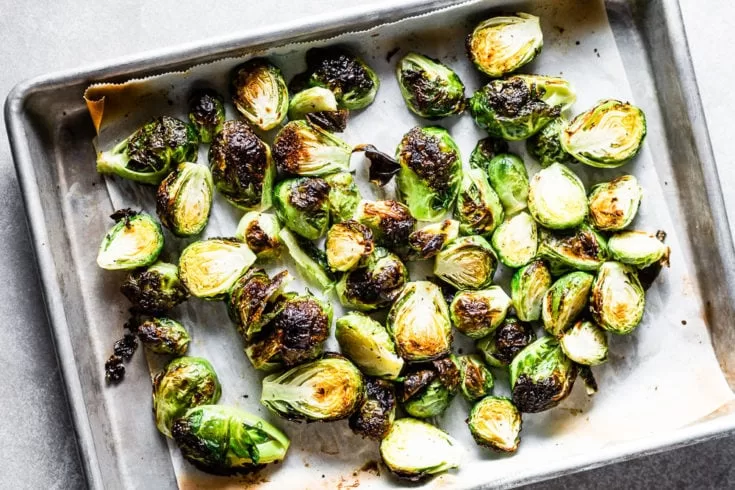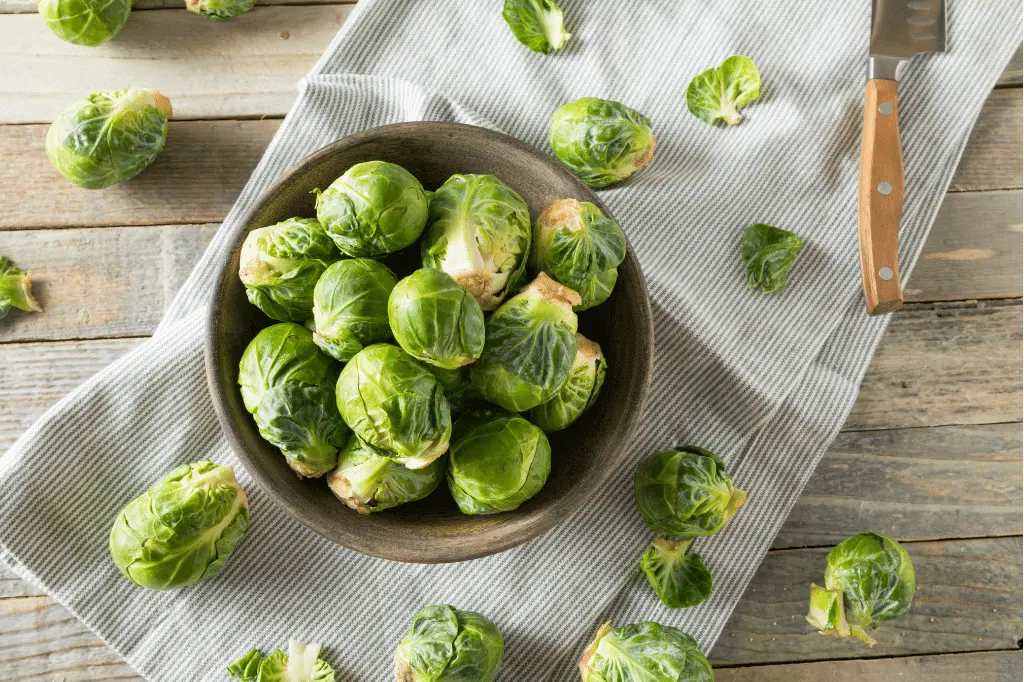Can Dogs Eat Cooked Brussels Sprouts? When it comes to our furry friends, we always want to make sure they’re getting a balanced and nutritious diet. As responsible dog owners, we often wonder if certain human foods, like cooked Brussels sprouts, can be safely shared with our canine companions.
Table of Contents
In this comprehensive guide, we will explore the topic of dogs consuming cooked Brussels sprouts, providing you with all the information you need to make an informed decision about incorporating this vegetable into your dog’s diet.
The Nutritional Benefits of Cooked Brussels Sprouts for Dogs
Cooked Brussels sprouts are packed with essential nutrients that can provide numerous health benefits for our dogs. These small cruciferous vegetables are rich in fiber, vitamins, and antioxidants that contribute to a well-rounded diet for our furry friends.
Fiber for a Healthy Digestive System
Cooked Brussels sprouts are an excellent source of dietary fiber, which plays a crucial role in maintaining a healthy digestive system for dogs. Fiber promotes regular bowel movements, reducing the risk of constipation and diarrhea. It also helps to regulate blood sugar levels and promotes a feeling of fullness, making it beneficial for overweight dogs or those with diabetes.
Essential Vitamins and Minerals
Cooked Brussels sprouts are a nutritional powerhouse, containing essential vitamins and minerals that contribute to your dog’s overall well-being. They are particularly rich in vitamins K, C, and A. Vitamin K is essential for blood clotting and bone metabolism, while vitamins C and A support the immune system, promote healthy skin and coat, and aid in eye health. Additionally, Brussels sprouts provide minerals such as potassium, calcium, and manganese, which are necessary for bone health, fluid balance, and proper muscle function.
Also Read: German Shepherd Great Dane Mix: Guide, Info and More
Antioxidants for Cellular Health
One of the standout benefits of cooked Brussels sprouts is their high antioxidant content. Antioxidants are crucial for protecting cells from oxidative damage caused by free radicals. The antioxidants present in Brussels sprouts, such as sulforaphane and Kaempferol, have anti-inflammatory properties and may help prevent certain types of cancers and age-related diseases. These antioxidants also support cognitive function and cardiovascular health in dogs.
Potential Downsides of Feeding Cooked Brussels Sprouts to Dogs

While cooked Brussels sprouts offer numerous health benefits, it’s important to be aware of the potential downsides and exercise caution when incorporating them into your dog’s diet.
Gas and Bloating
One of the most well-known side effects of cooked Brussels sprouts is their tendency to cause gas and bloating in dogs. This is due to their high fiber content and the presence of a substance called raffinose. While some gas is a normal part of the digestive process, excessive gas can cause discomfort for your furry friend. It’s essential to introduce cooked Brussels sprouts gradually and in moderation to avoid digestive upset.
Digestive Issues
Cooked Brussels sprouts, if consumed in large quantities or prepared improperly, can lead to digestive issues in dogs. The tough and fibrous nature of Brussels sprout stalks can be difficult for dogs to digest, potentially causing gastrointestinal upset, including stomach pain and diarrhea. It is advisable to remove the hard stem and serve only the leaves and sprouts to make them easier to digest.
Choking Hazard
When feeding cooked Brussels sprouts to your dog, it’s crucial to cut them into small, bite-sized pieces to prevent choking. Never offer your dog a whole Brussels sprout, as it can pose a choking hazard or cause an intestinal blockage.
How to Safely Prepare Cooked Brussels Sprouts for Your Dog
To ensure the safety and maximum nutritional benefit of cooked Brussels sprouts for your dog, it’s important to follow proper preparation methods. Here are some guidelines to help you safely incorporate this vegetable into your dog’s diet:
- Choose Fresh and Organic Brussels Sprouts: Opt for green and firm Brussels sprouts, preferably organic, to minimize exposure to pesticides and chemicals.
- Thoroughly Wash and Remove Stems: Before cooking, wash the Brussels sprouts to remove any dirt or impurities. Cut off the hard stem, leaving only the leaves and sprouts.
- Cooking Methods: Steaming Brussels sprouts is the best cooking method to preserve their nutritional value and antioxidant properties. Alternatively, you can boil or microwave them, but be aware that boiling may cause some nutrient loss.
- Avoid Seasonings and Oils: When preparing cooked Brussels sprouts for your dog, refrain from adding any seasonings, onions, garlic, butter, salt, or pepper. These ingredients can be harmful to dogs. Serve them plain, without any oils or added flavorings.
- Proper Portion Sizes: The portion size of cooked Brussels sprouts for your dog depends on their size. As a general guideline, small dogs can safely consume one to two sprouts, while larger dogs can have up to five. Consult with your vet for better recommendations based on your dog’s individual needs.
- Introduce Gradually: When introducing cooked Brussels sprouts to your dog’s diet for the first time, start with a small portion, such as ¼ to ½ of a sprout. Observe your dog for any signs of digestive discomfort or intolerance. If your dog can tolerate it well, you can gradually increase the quantity over time.
Other Dog-Friendly Vegetables to Consider
If you’re looking to diversify your dog’s vegetable options, there are several other safe and nutritious options to consider. Here are some dog-friendly veggies that can be included in your dog’s diet:
- Broccoli: Rich in vitamins and fiber, broccoli is a nutritious addition to your dog’s diet. Be sure to steam or lightly cook it before serving.
- Carrots: Carrots are low in calories and high in vitamins and fiber. They make a crunchy and healthy treat for dogs.
- Cauliflower: Similar to Brussels sprouts, cauliflower is a cruciferous vegetable that offers many health benefits for dogs. It can be steamed or cooked and served in moderation.
- Green Beans: Green beans are a great source of fiber and vitamins for dogs. You can serve them cooked or raw as a healthy snack.
- Sweet Potatoes: Sweet potatoes are packed with vitamins and fiber. They can be cooked and mashed or baked as a tasty treat for your furry friend.
Remember, always introduce new vegetables gradually and in moderation, monitoring your dog’s reaction and consulting with your veterinarian if you have any concerns.
Conclusion
In conclusion, cooked Brussels sprouts can be a safe and nutritious addition to your dog’s diet when prepared and served properly. They offer a range of health benefits, including fiber for a healthy digestive system, essential vitamins and minerals, and antioxidants for cellular health. However, it’s crucial to be mindful of potential downsides, such as gas and digestive issues, and to introduce cooked Brussels sprouts gradually and in portion sizes appropriate for your dog’s size. As with any dietary changes, it’s always best to consult with your veterinarian to ensure the well-being of your furry friend. With proper preparation and moderation, cooked Brussels sprouts can be a tasty and healthy treat for your canine companion.
Additional Information:
- Can my dog eat cauliflower and Brussels sprouts? Yes, cauliflower and Brussels sprouts are both safe for dogs to eat when cooked and served in moderation. They offer similar nutritional benefits to cooked Brussels sprouts and can be a healthy addition to your dog’s diet.
- What are the best vegetables for dogs? In addition to cooked Brussels sprouts, other dog-friendly vegetables include broccoli, carrots, cauliflower, green beans, and sweet potatoes. These vegetables provide essential nutrients and can be served cooked or lightly steamed as part of a balanced diet for your dog.

